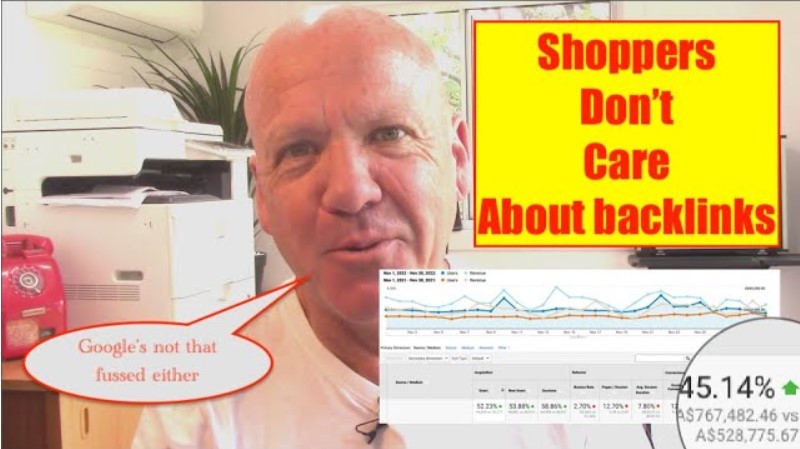
by Jim December 6, 2022
Welcome back. We’ve just got through the Black Friday sales and it was a whopper this year. Biggest one ever in Australia in terms of search volume and sales according to Shopify. It’s not looking good for the Boxing Day sales according to early data, so we’ll have to wait for that result. Big brands have done well, and it reinforces what I teach (and Google confirms) that brand power will out-rank backlinks. We don’t do it and I recommend you don’t either. Focus on your UX and ad copy and Google will reward you.
What I learned
- Australia’s biggest Black Friday sales ever.
- What does that mean for Boxing Day?
- 75% of our clients surpassed their budgets!
- Why links don’t impact rankings as much.
- Focus your efforts on the customer experience.
Transcript
Welcome back Rankers! How are you going? We just had our biggest Black Friday in the history of the world. In Australia at least. What do I mean by that? Well, we had more search volume, and certainly Shopify has already come out and said that it has been the biggest for sales. But just looking at these Google Trends right here, you can see that Black Friday, more searches for Black Friday than anything else. All the big brands, the normal ones you would know about and expect to trend did so. The JB Hi-Fis, Kmart, all of those, BIG W, Harvey Norman, all your big box stores all trended. Now, what’s going to be interesting for the rest of the year is what happens to Boxing Day sales? Because traditionally, that’s when all the big box stuff used to happen. And what we are seeing at the moment is we’ve seen a decline in Boxing Day interest.
The upsurge in Black Friday
So ever since the last three years, it has started to decline in popularity. Now, lockdowns may have had something to do with that of course, but certainly, Black Friday has taken some of those sales except for some brands. And what was interesting, when I was going through and doing these numbers, I looked at JB Hi-Fi, which is, as you would expect, an electronics retail company. You can start to see where we’ve got these two spikes here at the end of the year for JB Hi-Fi in interest, and back here, there was only just the one. That’s before Black Friday took off in Australia, and then you can see here… Hang on a second, this big spike is starting to come down, starting to come down. But now, we get two at the end of the year, so that’s really good. And some of our clients have had their best months ever with their Black Friday sales. In fact, I think something like 75% of our clients at the moment are over budgets.
So, we keep a running tally and we set budgets for our client’s sales budgets, revenue budgets, because that’s the thing we can affect the most. And we have those set for all of our clients, and this month, happy to say 75% are over budget. We’ve had one client that’s actually just realised an exit strategy, which has just been awesome. So, we’ve been working with them for two years and the goal for this client was always to build it up to a certain level and then find a buyer. It looks like that’s on the cards for him right now so that’s pretty exciting, so that’s about the third or fourth client over the years I’ve taken through to their exit strategy. And then we have clients like this who he’s happy to… You’ve got a small business in New South Wales and Sydney, and he’s just had his biggest month ever, and we started working with this client back here. You can see all the annotations that have happened during that time. And we are looking at two graphs here: users and also revenue.
Now, it’s just embarrassing, up until about five, six years ago, I didn’t know there was a revenue graph that you could look at in Google Analytics, but you can. And yes, you can see that in GA4 as well. But you can see there, he’s just had his biggest month ever as well. In fact, he’s 200K over budget this month which has just been extraordinary for him. There was an article out this week from Barry Schwartz on… I see a Round Table, we’ll just bring that up. And surprise, surprise, Google has told us that links have a lot less significant impact for ranking today, which we knew 10 years ago, which actually, Barry to his credit does say in this article.
No place for backlinks
But if you are new to the industry, you might hear a lot still about, “We’ve got to get backlinks.” Backlinks, backlinks, backlinks. And the reason for that is back in the day when Google first started, before Google, all we used to do was keyword stuff. We used to put keywords everywhere, it used to be easy. Then Google came along and we had to do backlinks because what Google was looking at and why made it such a great search engine back in the day was that it was able to get better results for users because it would look at what pages were linking to other pages and it would look at those links as a vote for those other pages if you like, and from there, we started scanning backlinks.
Now, I never bought backlinks, and I know that might seem strange because everybody in the SEO industry tends to, but back in the day, we never did it because we didn’t have to. We would just go and get free ones. We had a good network that we could call on and we actually just used to do our own sites and get backlinks off free sites.
Brand power
And then in about 2009, 2010, I think Barry actually mentions it in this article with Matt Cutts, that all stopped because brands started to rank much higher than our clients, and if you had a brand, it was seemingly easy to rank because the branded sites had heaps of things wrong with them compared to our own client sites, yet the branded sites were ranking higher. And gradually, over the years, we worked out that a brand is the major impact when it comes to whether or not you’re going to rank well in Google.
And it makes sense because Google has to show the popular brands, and let’s not forget, in 2017, they said to us, URLs that are more popular on the internet tend to be crawled more often to keep them fresher in our index. How does Google know if a URL is popular? Because it has the greatest repository of brand information on the planet as far as what is popular. Up until 2014, the most Googled word in Google in Australia was Google. This is not news, so we haven’t been doing these backlinks for a very, very long time. And what we’ve been focusing on is the performance of the site, the experience the user has when they get to the site. To do that, we’ve used a lot of the Google tools but there’s still a huge backlinking industry that’s grown up. There’re courses on how to do backlinks, there’s software, expensive software that you could get, and a lot of people use these tools and we used to use them all as well, but we don’t.
We used to use all the big ones and I’m not even going to mention them, but we used to use all the big ones to look at backlinks and examine backlinks of our competitors and all those sorts of things… We don’t do any of that anymore. It just doesn’t matter because we haven’t done that for years, because when you’re focusing on revenue and when you have to hit a revenue number, going and finding a backlink to see if it’s going to get you ranked slightly higher so you can get more traffic just isn’t going to cut it. Things like trying to rank number one for shoes, which we’ve done in the past, or other generic terms like that, it’s not a great search term because it doesn’t give you terribly much intent.
In fact, in most cases with Google, you will find that those sorts of one word searches are more navigational based, like ‘shave’ is typically people looking for Dollar Shave Club. It’s not necessarily people looking to find out the meaning of the word shave, and that’s the fundamental difference say between a DuckDuckGo and a Google, is Google’s looking at the intent of the user. And part of that is making sure that you have a strong brand, a strong user experience, which is part of the brand. It’s the promise that you deliver to your customers is how well and how easy your site is to use, actually has an impact on your rankings. That’s why Google has Core Web Vitals. They don’t do it because they want your site to work well, they do it because they want users to experience sites that work well.
If you’ve been doing SEO in your own site and you’ve been using a lot of content, a lot of blogs and those sorts of things and you’ve been doing backlinking to get rankings, you might get the rankings. You might even get the traffic if your content is good and serves a purpose. However, in our experience, you don’t get the sales that you would if you simply went and took that time and effort and put some work into some good ads or put that work into good user experience on the site. You’re going to get far more sales and your growth is going to accelerate faster than what it would ever by just going out and trying to get backlinks or create content to get better rankings in Google.
That’s not what it’s about. You’ll get better rankings in Google when you become the thing that people are looking for and when you have the best site for that category, and when your brand is the strongest in that category or one of the strongest. Understand what people are looking for, understand what they want, and understand your shoppers. Hopefully that’s helpful and we’ll see you next week. Hopefully, you’ve had a fantastic Black Friday and you’re having a sensational year. Thanks very much. Don’t forget to like, share and subscribe. If you’d like me to give your site the once over to see where you could be making more money, drop me a line at [email protected]. Thanks very much. Bye.

Jim’s been here for a while, you know who he is.



